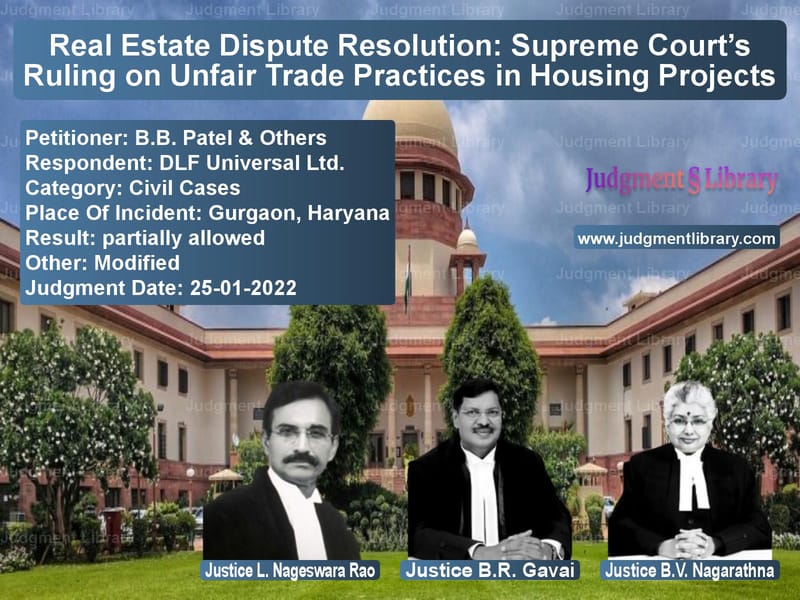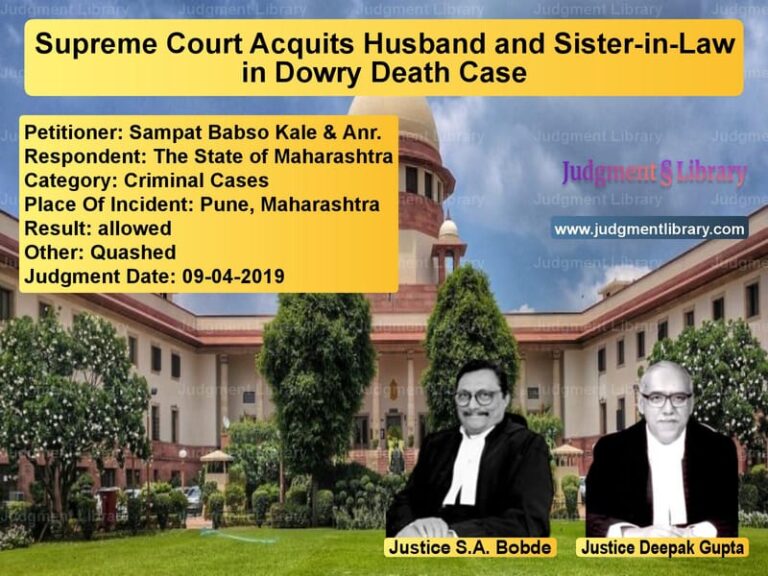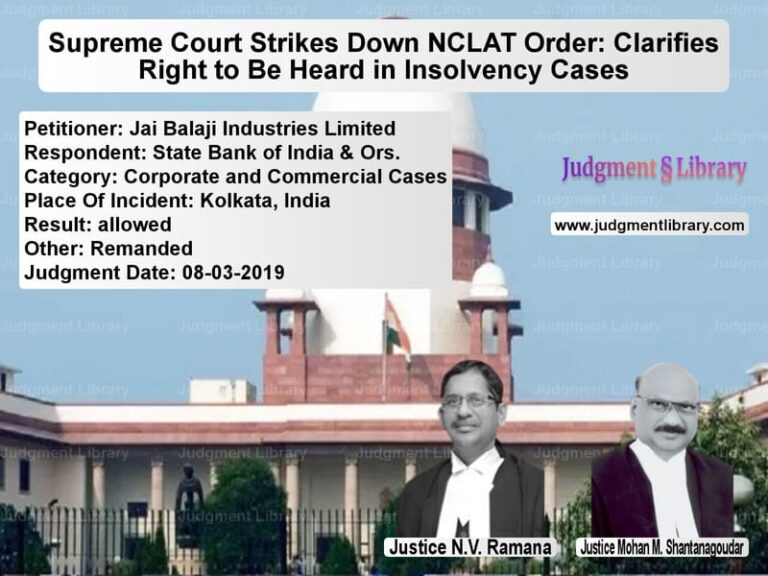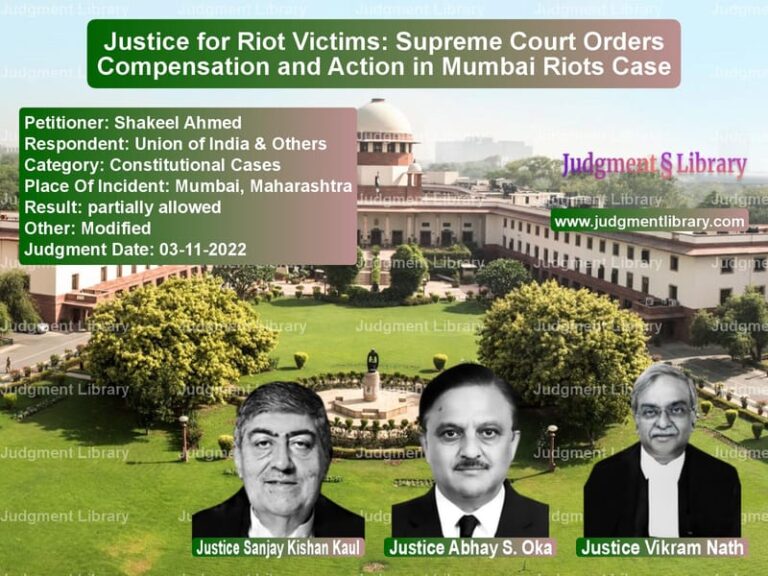Real Estate Dispute Resolution: Supreme Court’s Ruling on Unfair Trade Practices in Housing Projects
The real estate sector in India has witnessed numerous disputes over delayed possession, unfair pricing, and breach of agreements between homebuyers and builders. One such case reached the Supreme Court in B.B. Patel & Others vs. DLF Universal Ltd., where the appellants accused the builder of engaging in unfair trade practices. This case highlights the legal principles governing real estate contracts and the rights of homebuyers.
Background of the Case
The appellants, B.B. Patel and others, applied for allotment of four apartments in a residential project named “Beverly Park-I” at Qutab Enclave Complex in Gurgaon, developed by DLF Universal Ltd. The builder had advertised that possession of the flats would be handed over within two and a half years, and buyers could pay the remaining amount over the next seven and a half years. The appellants, lured by this attractive payment scheme, booked four apartments and signed an Apartment Buyer Agreement (ABA) on March 23, 1993.
However, several years passed without the possession being handed over. The appellants alleged that:
- Construction started much later than promised.
- They were subjected to undisclosed charges, including development charges, external electrification costs, and construction cost escalations.
- The agreement was one-sided and heavily favored the builder, making it impossible for buyers to challenge unfair demands.
Feeling aggrieved, the appellants filed a complaint before the Monopolies and Restrictive Trade Practices (MRTP) Commission, seeking relief against the builder’s alleged unfair trade practices.
Findings of the MRTP Commission
The MRTP Commission dismissed the appellants’ complaint, holding that:
- The agreement did not specify a rigid timeline for possession, and delays could be justified.
- The additional charges were part of the agreed terms and conditions.
- The appellants had continued paying installments without terminating the agreement, implying their consent to the changes.
Unhappy with this decision, the appellants moved the Supreme Court.
Petitioners’ Arguments
The appellants, represented by Senior Advocate M.L. Lahoti, contended that:
- The builder misled them by advertising a specific possession timeline, which was later altered.
- Additional charges were imposed arbitrarily, without prior disclosure.
- The delay in obtaining government approvals was solely the builder’s fault, and homebuyers should not be penalized.
- The ABA was one-sided, and its clauses favored the builder at the cost of the buyers.
- The MRTP Commission failed to consider how the delays and unexpected costs caused financial loss to the appellants.
Respondent’s Arguments
DLF Universal Ltd., the respondent, defended itself through Senior Advocate Pinaki Mishra, asserting that:
- The appellants voluntarily signed the agreement, which included clauses allowing for delays.
- Escalation in construction costs was unavoidable and justified due to material and labor price increases.
- The appellants had an option to terminate the contract and take a refund but chose to continue.
- Over 90% of other buyers had taken possession without disputes, proving that the appellants’ claims were exaggerated.
Supreme Court’s Observations
The Supreme Court, comprising Justices L. Nageswara Rao, B.R. Gavai, and B.V. Nagarathna, analyzed the legal principles governing the case. The Court noted:
“The agreement between the parties must be evaluated in light of its terms and conditions, but builders cannot take undue advantage of one-sided agreements.”
The Court acknowledged that while delays in real estate projects are common, builders must be transparent about expected timelines and additional costs.
Legal Principles Applied
The Supreme Court reviewed several past cases, including:
- Pioneer Urban Land & Infrastructure Ltd. vs. Govindan Raghavan – where it was held that one-sided real estate agreements are unfair and cannot be strictly enforced.
- Central Inland Water Transport Corporation vs. Brojo Nath Ganguly – where the Court struck down unfair contract terms that were against public interest.
- Bangalore Development Authority vs. Syndicate Bank – where the Court ruled that time is generally not the essence in real estate contracts unless explicitly mentioned.
The Court also examined the provisions of the MRTP Act, which define unfair trade practices as actions that mislead consumers or result in undue financial burdens.
Final Judgment
The Supreme Court partly allowed the appeal, ruling:
“The MRTP Commission’s ruling that there was no unfair trade practice is upheld, but in the interest of justice, the respondent shall hand over possession of the flats to the appellants on payment of Rs. 25,00,000 per flat.”
The Court provided the following reliefs:
- The appellants must pay Rs. 25,00,000 per flat within four weeks.
- The builder must hand over possession within a week of payment.
- The appellants must clear any legitimate pending dues before taking possession.
Implications of the Judgment
This ruling sets a significant precedent for real estate disputes:
- Transparency in Agreements: Builders must clearly disclose all charges and timelines at the outset.
- Fairness in Real Estate Contracts: Homebuyers should challenge one-sided clauses that unfairly benefit builders.
- Judicial Intervention in Consumer Rights: The judiciary can step in to provide relief even when a strict reading of the contract favors builders.
Conclusion
The Supreme Court’s ruling balances contractual obligations and fairness for homebuyers. While upholding the MRTP Commission’s decision, the Court ensured that the appellants were not left without relief. This judgment highlights the evolving nature of real estate law in India and the judiciary’s role in protecting consumer rights.
Petitioner Name: B.B. Patel & Others.Respondent Name: DLF Universal Ltd..Judgment By: Justice L. Nageswara Rao, Justice B.R. Gavai, Justice B.V. Nagarathna.Place Of Incident: Gurgaon, Haryana.Judgment Date: 25-01-2022.
Don’t miss out on the full details! Download the complete judgment in PDF format below and gain valuable insights instantly!
Download Judgment: b.b.-patel-&-others-vs-dlf-universal-ltd.-supreme-court-of-india-judgment-dated-25-01-2022.pdf
Directly Download Judgment: Directly download this Judgment
See all petitions in Property Disputes
See all petitions in Consumer Rights
See all petitions in Contract Disputes
See all petitions in Judgment by L. Nageswara Rao
See all petitions in Judgment by B R Gavai
See all petitions in Judgment by B.V. Nagarathna
See all petitions in partially allowed
See all petitions in Modified
See all petitions in supreme court of India judgments January 2022
See all petitions in 2022 judgments
See all posts in Civil Cases Category
See all allowed petitions in Civil Cases Category
See all Dismissed petitions in Civil Cases Category
See all partially allowed petitions in Civil Cases Category







